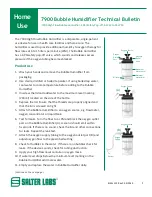
23
www.Ultra-Aire.com | 1-800-533-7533
Ultra-Aire XT155H Installation Instructions
Troubleshooting (Continued)
SERVICE
Symptom
Possible Reason
Troubleshooting Procedure
Troubleshooting Procedure for Performance
Related Issues
This method of diagnosis is used to function
check the internal components in the dehumidi-
fier. This is to be used when a performance issue
is suspected.
1. Set the humidity controller all the way to the
most humid setting or off position – Did the
unit shut off?
2. If yes, turn the fan setting to the ON position –
does the fan start?
3. If fan starts, leave in the fan ON position and
set the humidity all the way to driest setting.
May have to wait 5 minutes for the compressor
to start.
4. Listen for a distinct buzzing/humming sound
of a compressor starting up – do you hear this
noise?
5. If compressor is running and continues to run,
after about 15 minutes you should feel a slight
increase in air temperature being discharged
out of the discharge air side of the unit.
6. If so, depending on your environmental
conditions (temp/Rh%), you should see some
water production out of the hose within
30 minutes or so. (
Note: If the room
temperature is 55 degrees or below and/or
in area of low relative humidity, the
dehumidifier will produce little to no water.)
7. Collecting the water removed in a 24 hour period
will give a measurement of performance.
WARNING!
ELECTRICAL SHOCK HAZARD:
ELECTRICAL POWER MUST BE PRESENT
TO PERFORM SOME TESTS. THESE TESTS
SHOULD BE PERFORMED BY A QUALIFIED
SERVICE PERSON.
Fan is not running.
Dehumidification
or fan is being
called for.
1. Loose connection in
fan circuit.
2. Obstruction prevents
fan impeller rotation.
3. Defective fan.
4. Defective fan relay.
Low dehumidification
capacity (evaporator
is frosted
continuously).
Dehumidification is
being called for.
1. Defrost thermostat loose
or defective.
2. Low refrigerant charge.
3. Dirty air filter(s) or air flow
restricted.
4. Excessively restrictive
ducting connected to unit.
No ventilation.
Ventilation is being
called for.
1. Loose connection in
ventilation control circuit.
2. Loose connection in
damper power circuit.
3. Defective fresh air
damper.
Dehumidifier
removes some
water, but not as
much as expected.
1. Air temperature and/or
humidity have dropped.
2. Humidity meter and or
thermometer used are
out of calibration.
3. Unit has entered defrost
cycle.
4. Dirty air filter(s) or air flow
is restriced.
5. Defective defrost
thermostat.
6. Low refrigerant charge.
7. Air leak such as loose
cover or ducting leaks.
8. Defective compressor.
9. Restrictive ducting.






































